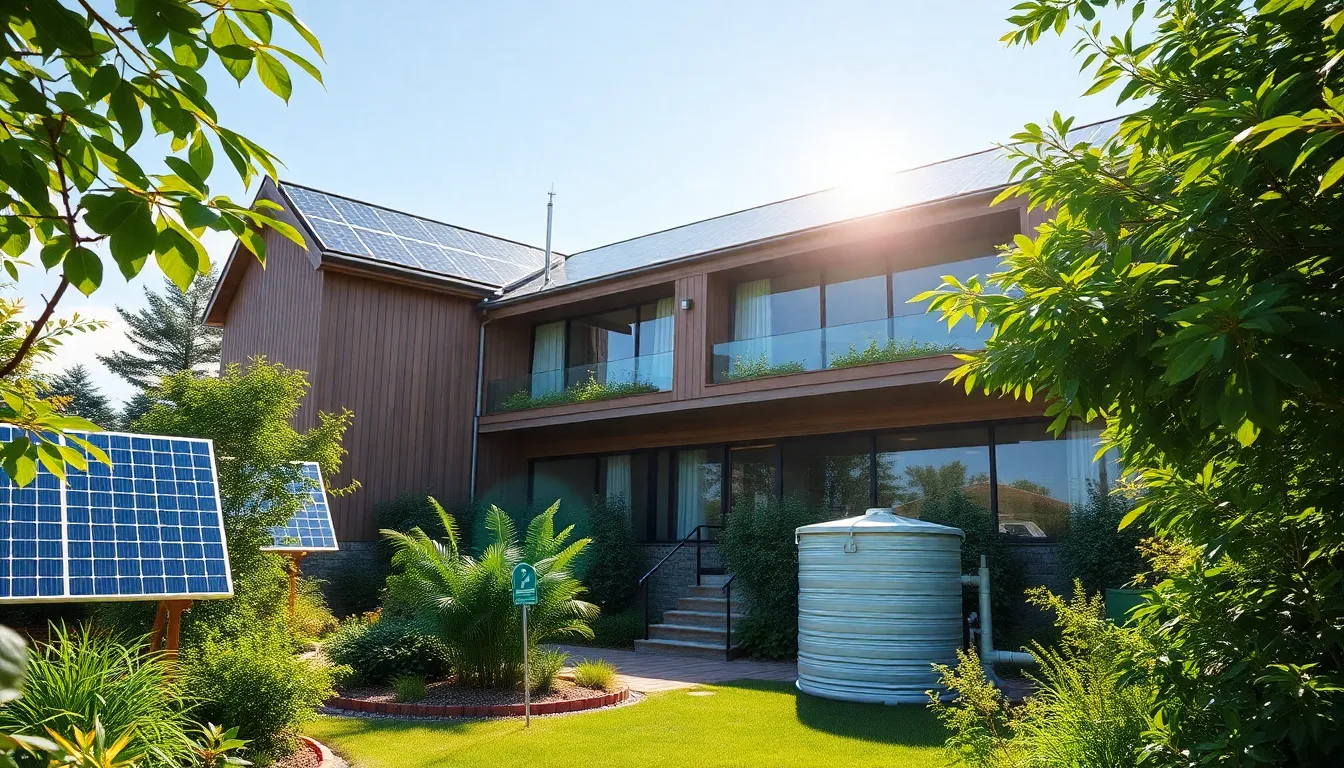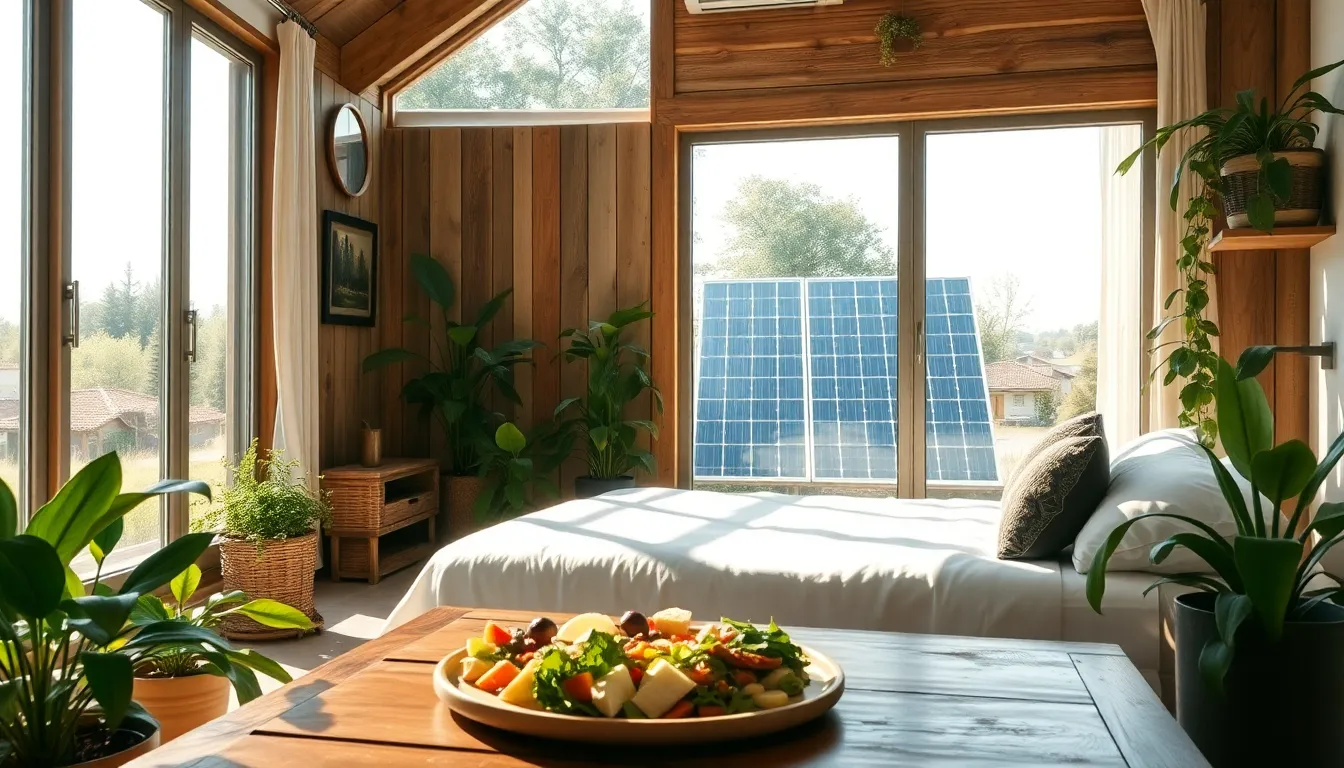Travelers today are more conscious than ever about their environmental impact. As they seek unique experiences, eco-friendly hotels have emerged as a popular choice, blending comfort with sustainability. These accommodations not only offer a cozy retreat but also prioritize practices that protect the planet.
From solar-powered energy systems to locally sourced food, eco-friendly hotels are redefining the hospitality industry. They cater to those who want to enjoy their getaway while minimizing their carbon footprint. With an increasing number of options available, finding the perfect green getaway has never been easier. Exploring these sustainable havens reveals a world where luxury and environmental responsibility coexist harmoniously.
Table of Contents
ToggleOverview of Eco-Friendly Hotels
Eco-friendly hotels focus on sustainability while providing comfortable accommodations. These establishments integrate practices that minimize environmental impact and promote conservation. Properties often feature renewable energy sources, such as solar panels, to power their operations.
These hotels typically use water-saving technologies, including low-flow faucets and rainwater harvesting systems. They prioritize the use of sustainable materials in construction and furnishings, opting for recycled or locally sourced materials whenever possible.
Locally sourced food is a common offering, allowing guests to enjoy fresh and organic meals. Many eco-friendly hotels engage in waste reduction strategies, including composting and recycling programs, to lessen their ecological footprint.
Guests can find accommodations with eco-certifications from reputable organizations, ensuring adherence to sustainable standards. As more travelers seek responsible options, eco-friendly hotels continue to grow in popularity, offering unique experiences that combine luxury and environmental stewardship.
Benefits of Staying in Eco-Friendly Hotels

Staying in eco-friendly hotels offers numerous advantages for both travelers and the environment. These accommodations create sustainable experiences that enhance guest enjoyment while promoting responsible tourism.
Environmental Impact
Eco-friendly hotels significantly reduce the carbon footprint through various sustainable practices. They utilize renewable energy sources, such as solar or wind power, and implement energy-efficient systems that decrease energy consumption. Water-saving technologies, like low-flow fixtures and rainwater harvesting, minimize waste while ensuring guest comfort. Additionally, eco-friendly hotels often prioritize eco-friendly materials in construction and furnishings, choosing recycled or sustainably sourced items. Many also incorporate waste reduction strategies, including composting, recycling, and minimizing single-use plastics, contributing to lower landfill waste.
Economic Advantages
Eco-friendly hotels support local economies by sourcing food and materials from nearby providers. This practice not only lowers transportation costs but also enhances regional agricultural practices. Many eco-friendly hotels attract environmentally conscious tourists, increasing visitor traffic and resulting in higher revenue for surrounding businesses. By embracing sustainable practices, these hotels often experience lower operating costs through reduced energy and water bills. Furthermore, eco-certifications can boost a hotel’s appeal, drawing more guests and promoting loyalty among environmentally aware consumers.
Features of Eco-Friendly Hotels
Eco-friendly hotels incorporate various sustainable features that enhance their commitment to environmental responsibility. These accommodations prioritize practices that reduce their ecological footprint while providing guests with comfort and luxury.
Sustainable Practices
Sustainable practices play a pivotal role in eco-friendly hotels. Many establishments utilize solar panels and wind turbines to generate renewable energy, significantly decreasing reliance on fossil fuels. Water-saving technologies, such as low-flow fixtures and rainwater harvesting systems, minimize water usage and promote conservation.
Additionally, eco-friendly hotels often utilize sustainable materials, like reclaimed wood and recycled construction materials, which reduce environmental degradation. Waste reduction strategies, including composting and the promotion of reusable products, further support ecological sustainability. Many hotels also emphasize sourcing food and amenities locally, supporting regional economies and reducing transportation emissions.
Green Certifications
Green certifications serve as indicators of a hotel’s commitment to sustainability. Numerous reputable organizations issue certifications based on specific eco-friendly criteria, ensuring hotels adhere to sustainable practices. Examples of popular green certifications include LEED (Leadership in Energy and Environmental Design), Green Key, and EarthCheck.
Obtaining such certifications typically involves meeting rigorous standards related to energy efficiency, water conservation, sustainable sourcing, and waste management. These certifications instill confidence in eco-conscious travelers, providing assurance that their stay contributes positively to the environment. Eco-friendly hotels that hold certifications often attract a clientele dedicated to responsible tourism, enhancing their marketability and reputation.
Popular Eco-Friendly Hotels Around the World
Eco-friendly hotels are increasingly popular choices for travelers seeking sustainable accommodations. Here are notable eco-friendly hotels across different regions.
North America
- The Green House Inn (New Orleans, Louisiana): This boutique hotel features solar panels, natural building materials, and a lush garden. Guests often enjoy amenities like a saltwater pool and organic breakfasts.
- Alison’s Inn & Vineyard (Newberg, Oregon): Known for its sustainable wine production, this hotel focuses on eco-conscious practices such as using solar energy and offering locally sourced food. Its commitment to sustainability supports the surrounding community.
- The Orchard Garden Hotel (San Francisco, California): This hotel implements energy-efficient lighting and water-saving devices. Guests appreciate the rooftop garden that contributes to urban greening and enhances biodiversity.
Europe
- Hotel Jatiuca (Maceió, Brazil): While located in South America, it’s often noted for its eco-friendly features. This hotel emphasizes water conservation and uses renewable energy sources, making it a popular spot for solar farming.
- The Zetter Hotel (London, England): Celebrated for its green design, this hotel incorporates rainwater harvesting, reclaimed wood, and energy-efficient systems. The rooftop garden provides fresh produce and an urban wildlife habitat.
- Eco Hotel Ecoland (Moscow, Russia): This hotel offers eco-friendly services like organic meals and energy-efficient rooms. Its focus on environmental preservation appeals to a growing demographic of conscious travelers.
Eco-friendly hotels represent a significant shift in the hospitality industry. They offer travelers a chance to enjoy comfort and luxury while being mindful of their environmental impact. By prioritizing sustainability through innovative practices and local sourcing, these hotels not only enhance guest experiences but also support local economies.
As awareness of environmental issues grows, the demand for eco-friendly accommodations is likely to increase. Travelers can take pride in choosing hotels that align with their values, knowing their choices contribute to a healthier planet. With a variety of options available worldwide, embracing eco-friendly hotels is an easy and rewarding way to travel responsibly.




